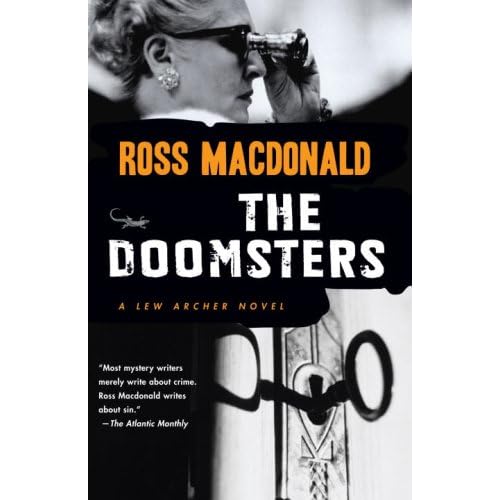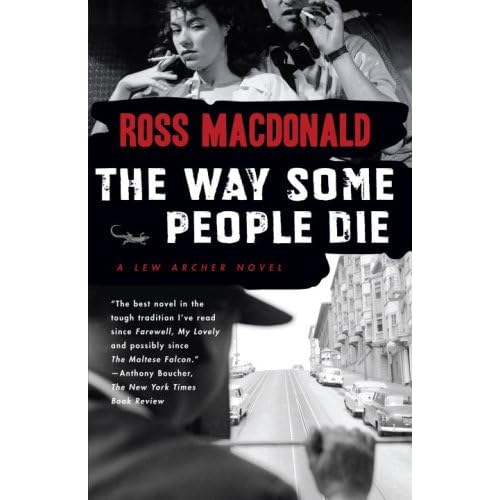
Right now I'm a happy man. One of the reasons I'm happy is that Vintage Crime/Black Lizard has just re-released two more long-out-of-print Ross Macdonald novels, The Doomsters and The Barbarous Coast. This follows the re-release back in July of The Ivory Grin and The Way Some People Die. It's almost criminal that these and several other Macdonald novels have been out of print so long, in some cases close to twenty years. These are classic American detective fiction, but more than that; they are books that bridged the genre gap into actual literary fiction.
Ross Macdonald (real name: Kenneth Millar) was the third of the seminal Big Three writers in the hard-boiled detective genre. First came Dashiell Hammett (The Maltese Falcon, The Thin Man), who established the form from its roots in the pulp magazines of the day. He was followed by Raymond Chandler (The Big Sleep, Farewell My Lovely), who combined Hammett's hard-boiled nature with a not-so-subtle romanticism. But it was Macdonald, through his alter ego Lew Archer, who added a psychological dimension to the standard detective thriller and turned it into true literature.
 Unlike Hammett's all-business Continental Op or Chandler's slumming angel Philip Marlowe, Macdonald's Lew Archer was as much psychologist or father confessor as he was a hard-boiled private detective. Archer was compelled to get to the reasons why the crime was committed, even if that took him back multiple generations within a family.
Unlike Hammett's all-business Continental Op or Chandler's slumming angel Philip Marlowe, Macdonald's Lew Archer was as much psychologist or father confessor as he was a hard-boiled private detective. Archer was compelled to get to the reasons why the crime was committed, even if that took him back multiple generations within a family. As a critic once noted, Macdonald's books aren't so much who-dunnits as why-dunnits. Starting with 1959's The Galton Case, Macdonald probed the psychological depths of cross-generational family sagas; the sins of the father (or mother) were often visited on or repeated by the son (or daughter). Archer wasn't necessarily out to bring the criminal to justice or to avenge the victim, but to discover the truth and perhaps bring a little peace to the current generation. As Macdonald had Archer say in one of his cases, "I have a secret passion for mercy. But justice is what keeps happening to people."
 I find the Lew Archer novels to be among my favorite novels, period -- no genre qualification necessary. I'd put Sleeping Beauty, The Underground Man, or The Goodbye Look up against anything from Hemingway or Steinbeck; they have the depth and intelligence and heart of true literature. I tend to reread two or three Macdonald books every year; having some previously unread (and hard-to-find) books re-released makes for a joyous occasion, in my book.
I find the Lew Archer novels to be among my favorite novels, period -- no genre qualification necessary. I'd put Sleeping Beauty, The Underground Man, or The Goodbye Look up against anything from Hemingway or Steinbeck; they have the depth and intelligence and heart of true literature. I tend to reread two or three Macdonald books every year; having some previously unread (and hard-to-find) books re-released makes for a joyous occasion, in my book. It's a shame, however, that Macdonald hasn't stayed in the eye of the reading public the same way that Hammett and Chandler have. Perhaps it's because there hasn't really been a faithful film adaption of Macdonald's best works; the slightly off-kilter Harper and The Drowning Pool (in which Paul Newman changed Lew Archer to Lew Harper and played him in an uncharacteristic rakish fashion) don't have the visceral impact of the movie versions of The Maltese Falcon and The Big Sleep -- two of the best movie mysteries (and most faithful adaptions) ever. (And, I suppose, Paul Newman is no Humphrey Bogart.) Of course, Macdonald's books are so layered that it may be impossible to condense them for the screen. In any case, it's a shame that so many of Macdonald's books have been out-of-print for so long. (Fortunately, Macdonald's final book, The Blue Hammer, along with The Instant Enemy, are due to be re-released on April 8, 2008 -- place your Amazon orders now!)
 (The fact that Macdonald was the logical successor to Hammett and Chandler begs the question who was the successor to Macdonald. Some have granted Robert B. Parker that honor; as much as I love Parker and Spenser, his fictional creation, I'm less convinced over time of the heritage. More likely, there is no natural successor to Hammett; with the end of the Archer books, the detective genre splintered into multiple sub-genres and authors, each worthy on their own merits but none advanced the entire genre as the Big Three had.)
(The fact that Macdonald was the logical successor to Hammett and Chandler begs the question who was the successor to Macdonald. Some have granted Robert B. Parker that honor; as much as I love Parker and Spenser, his fictional creation, I'm less convinced over time of the heritage. More likely, there is no natural successor to Hammett; with the end of the Archer books, the detective genre splintered into multiple sub-genres and authors, each worthy on their own merits but none advanced the entire genre as the Big Three had.)All that said, having two "new" Macdonald books to read makes me very happy. I hope you share in my delight by going out and purchasing your own copies of The Doomsters and The Barbarous Coast -- as well as special ordering any other book from Macdonald's distinguished catalog.
But that's just my opinion; reasonable minds may disagree.